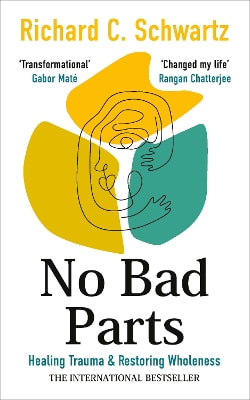IFS THERAPY
Internal Family Systems Therapy - IFS
I practice therapy called 'IFS', which was developed by Dr Richard Schwartz in the 1980s. Many other therapists, including Dr Bessel van der Kolk, and Dr Janina Fisher, also have a high regard for IFS Therapy.
Internal Family Systems is a type of 'Ego State' Therapy and is one of the most up-to-date, robust theories of personality. IFS Therapy has been evidence-based psychotherapy since 2015 but has been developed and adapted since the 1980s to become a therapeutic model in its own right. I use IFS ‘in person’ and also use IFS for ‘online therapy'.
Parts work isn’t new, and psychotherapists were doing their form of ‘parts work’ long before IFS. Parts have been around from the beginning, the surrounding atoms are made of parts, and they have been around longer than humans have existed... Ways of working with parts don’t stem from the Western world, but IFS Therapy provides us with a 'road map' and a new way of working with people’s parts in the world of psychotherapy. Another way of thinking about 'parts of ourselves' might be ‘aspects’ of ourselves.
Because trauma is often such a complex and overwhelming field, we benefit from a map or a language to understand, process and heal - IFS/Internal Family Systems and Ego State Therapy gives us this.
IFS Therapy is particularly beneficial for people who are interested in a positive change. The IFS theory is based on the idea everyone is made up of different ‘parts’ or 'aspects' of themselves - just think of the times you’ve been in two minds about something, had the 'internal battle' with yourself, or maybe you have felt and thought many different, things at once, feelings chop and change, and the mind races...
Just like individuals, all parts can have their own emotions, behaviours, beliefs and experiences.
Dr Richard Schwartz’s IFS model works on the idea we all have ‘Parts’ of us, that help us function. Parts are categorised into 3 groups, identified below, and then there is also Self, which is the space in which ‘Parts’ exist. See which of these parts you can recognise in yourself:
Firefighters – Help you cope when you feel overwhelmed.
Firefighters tend to have high energy to take over you. They are usually reactive and obsessive. They quickly put the fire of emotion or crisis out in different ways, such as dissociating and sending you to sleep.
Everyone has parts that fight/flight/freeze/faint/fawn. Some parts may take drugs, drink, smoke, binge on food, obsess, hard-working, or ‘working out’. They can also create pain as a distraction or as an attempt to tell you something. Firefights are the ultimate protectors. When they are doing their job, you might feel as if you have no control over what is happening to you. You may have a feeling of observing yourself do something.
Firefighters attend when there are high levels of stress, and they can react very quickly. Without Firefighter parts we would be very stressed indeed, they help us live, but often don’t realise that there is some threat to the system through what they do, they are focused on their job. Usually, at the moment they are working, they help us feel better or okay. Firefighters don’t tend to deliberate or think much, they tend to see a threat and act fast!
Managers – They run the show most of the time, telling us what to do, and doing lots of thinking for us.
Managers are like your value system. They try to tell you what you should do. They often ‘run the show’ and are trying to help you get through each day and moment. They may tell you “Get up, go to work”, “Don’t worry, just relax”, “you made such a fool of yourself”, “do this”, “do that”, “go to therapy”, “don’t go to therapy”, “have a drink”. Managers are trying to help, but sometimes create conflict in the system, especially with the Firefighters. Sometimes these parts have been trying to work so hard, for so long, that they are ‘burdened’ with stress or exhausted. Managers can also ‘pre-empt’ difficult situations and get you using ‘something’ as a way of coping, I.e., food, drugs, alcohol, work, etc. Managers give you messages every day, and if a Firefighter had taken you over for a while, the managers typically come back to quickly criticize or shame they typically show up in our thoughts - the internal dialogue “Look you’ve done it again”, “next time don’t be so....”, “it wasn’t that bad” These manage parts are often in need of some therapy themselves!
Exiles – Parts that have been hurt, rejected, and abandoned.
These are younger wounded parts that have been ‘exiled’ into the unconscious. Exiles are parts that are frozen in time, from historical hurt, abandonment and trauma. Managers and Firefighters exile by denying, i.e. “Cheer up, it wasn’t that bad” or the behaviour a firefighter might drink to stop the hurt. As a child, we may learn just to do something that helps us not feel, like eat or behave in a certain adaptive way. The exile becomes trapped in time by managers and firefighters, not allowing it into present-day awareness. Sometimes they bubble up through behaviours, dreams, emotions, ‘flashbacks’, and physical symptoms. Exiles need more than therapy, they need healing, they need a different experience, and they need to be released and looked after kindly in the present.
The Self –
The Self is not a part – it is the space inside which holds parts. The Self just is, without an agenda other than love and compassion for parts and other people’s parts. The Self has very capable qualities. These qualities are known as the 7 C's: compassion, calm, clarity, confidence, connectedness, courage, and curiosity. The Self can also allow healing to take place when parts feel the quality of the Self’s energy. Self is something that we are all born with, and parts support the self to live and survive.
In IFS Therapy, I will help you to identify and spot ‘Parts’, help ‘un-blend’ and separate from them. I will help you to heal and unburden parts through your inner world Self, so you have access to more Self Energy (your best feeling of you). In doing IFS Therapy you will become more aware, clear, confident, calm etc. and your internal system world will start to run smoother, so you feel better.
A therapist practising IFS Therapy should have a minimum of a Lv1 Cert from The IFS Institute or IFS UK (IFS UK is part of The IFS Institute). I would also recommend you make sure someone practising IFS, or any type of mental health support is a fully qualified, insured, and/or accredited & regulated mental health professional such as a: counsellor, psychotherapist, psychologist, psychiatrist... The easiest way to do this is to check is through a professional/ethical body such as BACP, NCPS, UKCP or BSP
I’m trained in IFS levels 1, 2, 3 & Masterclasses (inc. Dissociation) as well as many other therapies Inc. counselling & psychotherapy. Furthermore, I have also had a ‘successful’ experience working with parts known as ‘Unattached burdens’ and ‘Legacy burdens’ which can be thought of as things we’ve inherited from others.
E.g. a person might say “I’m anxious just like my mum, and grandfather,”, or “I think just like my dad,” or someone may say something like “There’s just this part of me which isn’t like me at all..”
I’ve been a therapist for a long time and have been using IFS since 2019. I must have over 2000 hours of IFS experience by now. Before my IFS Therapy training, I practised person-centred and other models since 2005. I have seen powerful transformations through IFS and somatic approaches, so it’s now my main approach to my therapy. See all my experience and training here.
An IFS Psychotherapist will help you access Parts and Self. IFS Therapy promotes healing from hurt and painful experiences, from the inside, without ‘going there’ until your system is ready. IFS can also give you a sense of more control, as if the parts above don’t have control over you. Unlike other therapies, IFS works with you and your parts, rather than against them. This is why therapies that do not respect the system or parts often fail or result in relapse. You become your therapist to your parts, and that’s partly why IFS works so quickly and well. IFS sessions should be 1.5 hours if possible as the extra time is needed to access parts, Self and to do the work with them. Regular IFS sessions (even fortnightly 1.5-hour sessions, as opposed to weekly 50-minute sessions) may be more cost-effective as they can get results quicker, and when the healing takes place, it’s permanent!
If you are not close to Liverpool and you would like to work with me online, you might also find my other website useful: Online IFS Therapy
IFS Therapy is a very thorough therapy. There are some key components of how IFS Therapy helps:
Whether you would like to work with me using exclusively IFS Therapy, or an integration of Therapies underpinned by IFS Theory, you are welcome to work with me.
I practice therapy called 'IFS', which was developed by Dr Richard Schwartz in the 1980s. Many other therapists, including Dr Bessel van der Kolk, and Dr Janina Fisher, also have a high regard for IFS Therapy.
Internal Family Systems is a type of 'Ego State' Therapy and is one of the most up-to-date, robust theories of personality. IFS Therapy has been evidence-based psychotherapy since 2015 but has been developed and adapted since the 1980s to become a therapeutic model in its own right. I use IFS ‘in person’ and also use IFS for ‘online therapy'.
Parts work isn’t new, and psychotherapists were doing their form of ‘parts work’ long before IFS. Parts have been around from the beginning, the surrounding atoms are made of parts, and they have been around longer than humans have existed... Ways of working with parts don’t stem from the Western world, but IFS Therapy provides us with a 'road map' and a new way of working with people’s parts in the world of psychotherapy. Another way of thinking about 'parts of ourselves' might be ‘aspects’ of ourselves.
Because trauma is often such a complex and overwhelming field, we benefit from a map or a language to understand, process and heal - IFS/Internal Family Systems and Ego State Therapy gives us this.
IFS Therapy is particularly beneficial for people who are interested in a positive change. The IFS theory is based on the idea everyone is made up of different ‘parts’ or 'aspects' of themselves - just think of the times you’ve been in two minds about something, had the 'internal battle' with yourself, or maybe you have felt and thought many different, things at once, feelings chop and change, and the mind races...
Just like individuals, all parts can have their own emotions, behaviours, beliefs and experiences.
Dr Richard Schwartz’s IFS model works on the idea we all have ‘Parts’ of us, that help us function. Parts are categorised into 3 groups, identified below, and then there is also Self, which is the space in which ‘Parts’ exist. See which of these parts you can recognise in yourself:
Firefighters – Help you cope when you feel overwhelmed.
Firefighters tend to have high energy to take over you. They are usually reactive and obsessive. They quickly put the fire of emotion or crisis out in different ways, such as dissociating and sending you to sleep.
Everyone has parts that fight/flight/freeze/faint/fawn. Some parts may take drugs, drink, smoke, binge on food, obsess, hard-working, or ‘working out’. They can also create pain as a distraction or as an attempt to tell you something. Firefights are the ultimate protectors. When they are doing their job, you might feel as if you have no control over what is happening to you. You may have a feeling of observing yourself do something.
Firefighters attend when there are high levels of stress, and they can react very quickly. Without Firefighter parts we would be very stressed indeed, they help us live, but often don’t realise that there is some threat to the system through what they do, they are focused on their job. Usually, at the moment they are working, they help us feel better or okay. Firefighters don’t tend to deliberate or think much, they tend to see a threat and act fast!
Managers – They run the show most of the time, telling us what to do, and doing lots of thinking for us.
Managers are like your value system. They try to tell you what you should do. They often ‘run the show’ and are trying to help you get through each day and moment. They may tell you “Get up, go to work”, “Don’t worry, just relax”, “you made such a fool of yourself”, “do this”, “do that”, “go to therapy”, “don’t go to therapy”, “have a drink”. Managers are trying to help, but sometimes create conflict in the system, especially with the Firefighters. Sometimes these parts have been trying to work so hard, for so long, that they are ‘burdened’ with stress or exhausted. Managers can also ‘pre-empt’ difficult situations and get you using ‘something’ as a way of coping, I.e., food, drugs, alcohol, work, etc. Managers give you messages every day, and if a Firefighter had taken you over for a while, the managers typically come back to quickly criticize or shame they typically show up in our thoughts - the internal dialogue “Look you’ve done it again”, “next time don’t be so....”, “it wasn’t that bad” These manage parts are often in need of some therapy themselves!
Exiles – Parts that have been hurt, rejected, and abandoned.
These are younger wounded parts that have been ‘exiled’ into the unconscious. Exiles are parts that are frozen in time, from historical hurt, abandonment and trauma. Managers and Firefighters exile by denying, i.e. “Cheer up, it wasn’t that bad” or the behaviour a firefighter might drink to stop the hurt. As a child, we may learn just to do something that helps us not feel, like eat or behave in a certain adaptive way. The exile becomes trapped in time by managers and firefighters, not allowing it into present-day awareness. Sometimes they bubble up through behaviours, dreams, emotions, ‘flashbacks’, and physical symptoms. Exiles need more than therapy, they need healing, they need a different experience, and they need to be released and looked after kindly in the present.
The Self –
The Self is not a part – it is the space inside which holds parts. The Self just is, without an agenda other than love and compassion for parts and other people’s parts. The Self has very capable qualities. These qualities are known as the 7 C's: compassion, calm, clarity, confidence, connectedness, courage, and curiosity. The Self can also allow healing to take place when parts feel the quality of the Self’s energy. Self is something that we are all born with, and parts support the self to live and survive.
In IFS Therapy, I will help you to identify and spot ‘Parts’, help ‘un-blend’ and separate from them. I will help you to heal and unburden parts through your inner world Self, so you have access to more Self Energy (your best feeling of you). In doing IFS Therapy you will become more aware, clear, confident, calm etc. and your internal system world will start to run smoother, so you feel better.
A therapist practising IFS Therapy should have a minimum of a Lv1 Cert from The IFS Institute or IFS UK (IFS UK is part of The IFS Institute). I would also recommend you make sure someone practising IFS, or any type of mental health support is a fully qualified, insured, and/or accredited & regulated mental health professional such as a: counsellor, psychotherapist, psychologist, psychiatrist... The easiest way to do this is to check is through a professional/ethical body such as BACP, NCPS, UKCP or BSP
I’m trained in IFS levels 1, 2, 3 & Masterclasses (inc. Dissociation) as well as many other therapies Inc. counselling & psychotherapy. Furthermore, I have also had a ‘successful’ experience working with parts known as ‘Unattached burdens’ and ‘Legacy burdens’ which can be thought of as things we’ve inherited from others.
E.g. a person might say “I’m anxious just like my mum, and grandfather,”, or “I think just like my dad,” or someone may say something like “There’s just this part of me which isn’t like me at all..”
I’ve been a therapist for a long time and have been using IFS since 2019. I must have over 2000 hours of IFS experience by now. Before my IFS Therapy training, I practised person-centred and other models since 2005. I have seen powerful transformations through IFS and somatic approaches, so it’s now my main approach to my therapy. See all my experience and training here.
An IFS Psychotherapist will help you access Parts and Self. IFS Therapy promotes healing from hurt and painful experiences, from the inside, without ‘going there’ until your system is ready. IFS can also give you a sense of more control, as if the parts above don’t have control over you. Unlike other therapies, IFS works with you and your parts, rather than against them. This is why therapies that do not respect the system or parts often fail or result in relapse. You become your therapist to your parts, and that’s partly why IFS works so quickly and well. IFS sessions should be 1.5 hours if possible as the extra time is needed to access parts, Self and to do the work with them. Regular IFS sessions (even fortnightly 1.5-hour sessions, as opposed to weekly 50-minute sessions) may be more cost-effective as they can get results quicker, and when the healing takes place, it’s permanent!
If you are not close to Liverpool and you would like to work with me online, you might also find my other website useful: Online IFS Therapy
IFS Therapy is a very thorough therapy. There are some key components of how IFS Therapy helps:
- Accesses our deeper Self
- Releases energies
- Focusing
- Healing
- Inner child work - if you’ve struggled to get to your inner child, this is the therapy that will get you there!
- Memory re-consolidation
- Releases and heals trans-generational trauma
- Self-healing
- ‘Shadow Work’
- Somatic Work
- Talk Therapy
- Works with ‘defensive/protective parts’ not against
Whether you would like to work with me using exclusively IFS Therapy, or an integration of Therapies underpinned by IFS Theory, you are welcome to work with me.
Below is Dr. Richard Schwartz, founder of Internal Family Systems
|
|
|
If you would like to read more about
IFS Therapy then this is a good place to
start:
IFS Therapy then this is a good place to
start:






